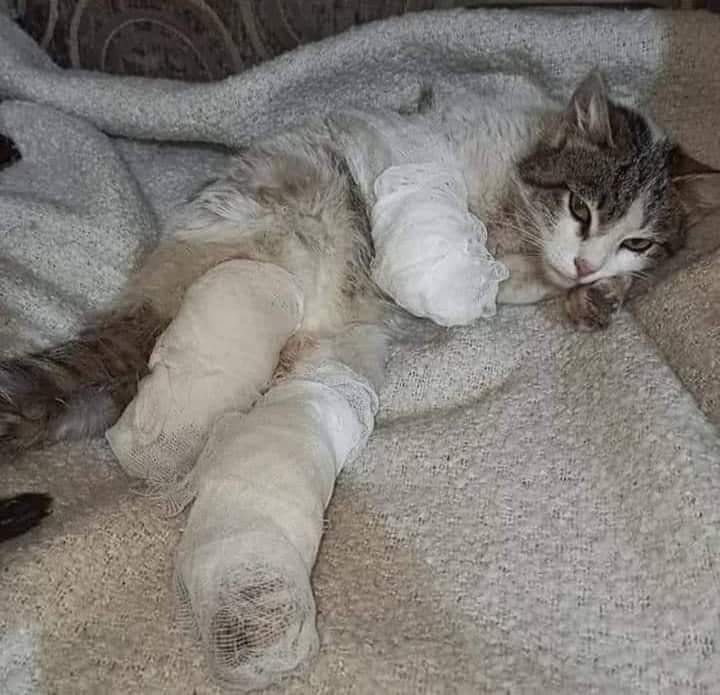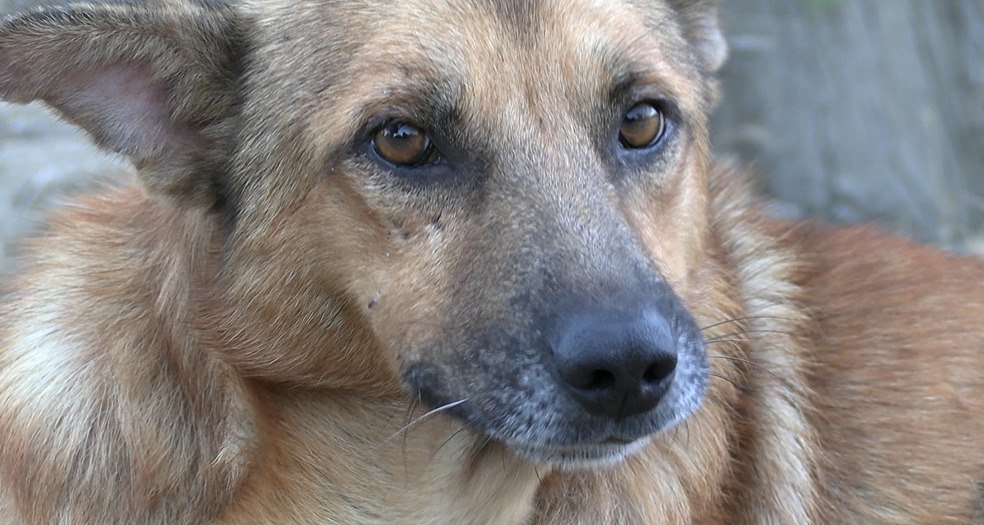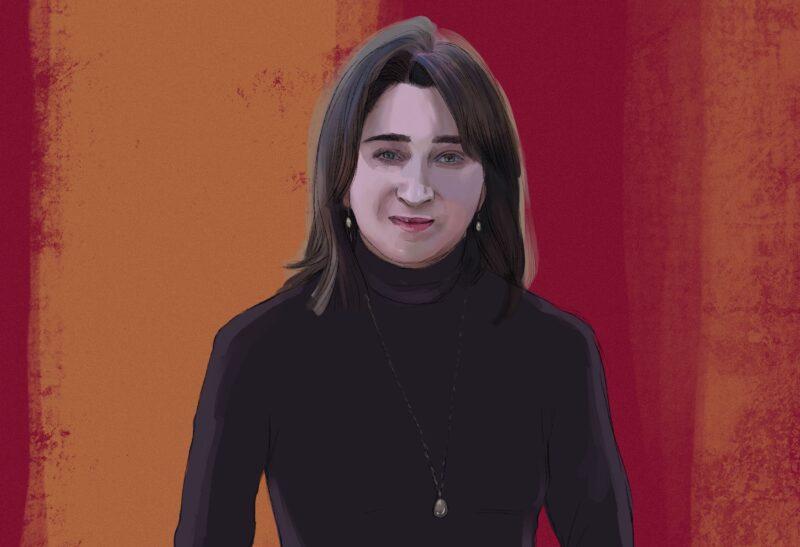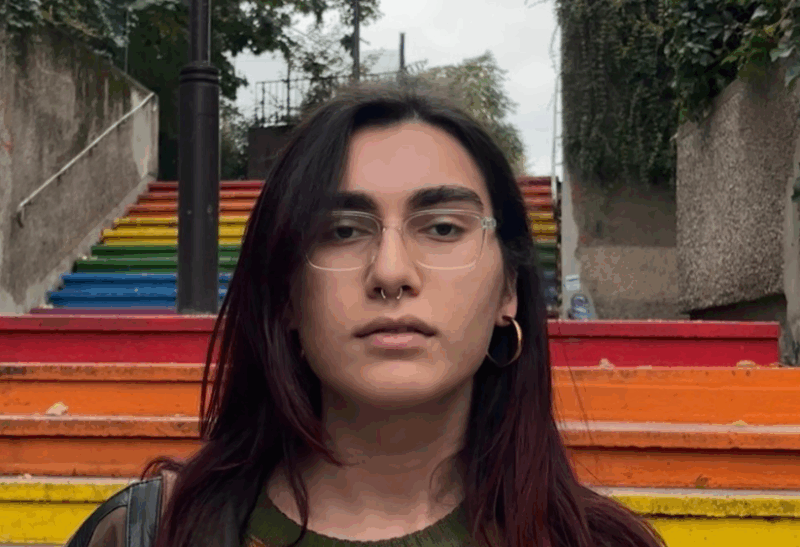On October 4th, on International Animal Day, Meydan TV collected stories of homeless animals that have suffered from human cruelty. Nevertheless, these are stories with a happy ending.
It all started with a knife stroke
The story of Mia, a cat with only one healthy paw left, began in the Azerbaijani city of Khachmaz. In March 2021, a butcher from whose shop Mia was scavenging…

The video of a cat bleeding with severed paws went viral on social media. Despite her critical condition, it was decided to rescue her. A animal rights activist from Khachmaz brought her to Baku. She also launched a fundraising campaign for Mia’s rescue.
Mia underwent two surgeries. Initially, in Baku, she had a minor bone operation, which was a preparatory step for prosthetics. Then, on May 3rd of the same year, Mia was taken to Turkey. In a clinic in Istanbul, she was fitted with bio-prosthetics. Unfortunately, the prosthetics didn’t fully adapt, but that hasn’t hindered her mobility, as her current owner explains.
Initially, there were plans to euthanize Mia because she was in severe pain. However, these plans were reconsidered, and she was given medical treatment:
“In the beginning, Mia was extremely frightened of people. Her fear was evident in her eyes. But now, all her fears have dissipated. She enjoys it when people pet her. She moves around normally. Though she can’t jump as high as she used to, she easily hops from the couch to the floor. Sometimes, she wants to scratch behind her ear with her paw and realizes she can’t.”



Cognac and His Lost Friend
Mia is not the first or the last animal to find a home after suffering while living on the streets. There are no official records of how many stray cats and dogs roam the streets of Azerbaijan, but unofficial estimates number them in the tens of thousands. Some of them are fortunate enough to find places where they won’t go hungry while remaining on the streets.

For example, there’s a dog that animal advocates named Cognac due to his “cognac” coat color. However, Cognac is afraid to look people in the eye, making it difficult to understand his feelings.
Cognac used to have a friend, a dog that the same animal advocates named Wolf. They had found a spot for themselves in a small forest within the city. But one day, a car struck Wolf, and Cognac temporarily left the forest. When he returned, the animal advocates found him emaciated and almost blind. But now, the dog is doing well and has even gained some weight.
Not far from the woods where Cognac lives, there used to be an animal shelter. However, it was later closed, and the dogs found themselves back on the streets. This area is known for people bringing and abandoning their dogs here, so they won’t find their way back home. Abandoned dogs like these can be easily identified by their collars and neatly trimmed claws. Typically, stray dogs have an unkempt appearance, but they look at anyone who approaches them with food in their hands with love in their eyes.

Statistics on dog bites versus statistics on crimes against dogs
In Azerbaijan, there are no statistical records available, not only regarding the number of homeless animals but also concerning crimes against them. An approximate number of such crimes can only be estimated based on data published by animal advocates. For instance, since the beginning of 2023, they have received more than 45 complaints about the shooting of dogs. It is claimed that some of these cases are connected to the authorities, although the authorities themselves have dismissed these allegations as unsubstantiated. The Ministry of Internal Affairs has not provided any clarity on this matter.

According to Meydan TV’s own calculations, in 2022, there were only four reports in pro-government media about fines of 500 Azerbaijani Manats (approximately $295) for animal cruelty. The Ministry of Internal Affairs (MVD) does not disclose the exact number of individuals fined during that year, and local media, citing the MVD, published seven such reports in a year. However, animal advocates documented over 30 cases of animal cruelty in 2022, and that’s just the information that was made public.
The problem lies in the fact that in Azerbaijan, official statistics related to animals are also limited. For example, last year, the Republican Center for Hygiene and Epidemiology of the Ministry of Health of Azerbaijan published this information.

Here, it is mentioned that during the first six months of 2022, 17,528 people sought medical attention with complaints of animal bites. Animal advocates perceive this as a form of negative publicity.
“This is related to the policy pursued by the Azerbaijani government. The government does not allocate funds for animal welfare and protection, and it does not allow those who want to do so. However, if a dog’s reaction to mistreatment by humans becomes too severe, pro-government media outlets begin to highlight it with dramatic headlines. Then, these dogs and cats, which, by law, are considered domestic animals, are classified as ‘street’ animals by these media outlets,” says Nijat Ismail, an animal rights advocate.
Moreover, the maximum punishment provided by Azerbaijani law for animal cruelty is just a fine.
In January 2023, animal advocates already spread information on four cases of animal abuse on social media.

In the current year, the Ministry of Internal Affairs (MIA) has published five reports on cases of animal cruelty. The latest information was related to an individual who tied the paws of nine cats and attempted to drown them. The 500 AZN fine for such a crime has sparked discontent among animal advocates.
There should be no animals in the metropolis
According to animal advocate Nijat Ismail, there should be no street animals in the metropolis at all. He argues that when animals live and reproduce on the streets, it harms their well-being, and until this problem is addressed, animals will continue to suffer.
“In Azerbaijan, there are significant gaps in animal rights. I would say it’s very poor in this regard. Government authorities practically do nothing for their protection and well-being. According to the European Convention and international practices, Azerbaijan should sterilize street animals at the state level, provide vaccinations, and support efforts to control their population within certain limits. However, in reality, government structures, municipal bodies, and executive authorities have chosen the simplest method – shooting and poisoning. What we need is to establish rehabilitation centers where animals would be sterilized, vaccinated, and then released back onto the streets, thereby maintaining a balance and gradually reducing their population,” he explains.

In 2023, lawyer Elmir Safarli stated in an interview with Radio “Azadlıq” that both attacks by homeless animals on children and the shooting of these animals are a result of a gross violation of existing legislation. According to the lawyer, the main problem lies in the absence of a relevant unified authority:
“The Ministry of Ecology and Natural Resources remains passive and takes no action. The funds allocated to the executive authorities are not disclosed to make this issue a topic of discussion. Overall, the existing legislation is decent. However, for example, the law states that tail docking is prohibited, but there is no specified fine for it. In addition, citizens face difficulties in covering medical expenses related to attacks by stray animals,” Elmir Safarli explained.
When homelessness is better than shelter
It’s worth noting that in 2007, Azerbaijan joined the European Convention for the Protection of Pet Animals, which required the government to implement necessary measures to reduce the population of stray animals without causing them suffering, as well as to create shelters. However, animal advocates argue that the reality is quite different.
For the past four years, Azerbaijan’s only state-run shelter for animals is the “Toplan Center for Homeless Dogs.” It is claimed that animals in this center are being euthanized. We were unable to obtain a comment from “Toplan” itself on this matter.
“The ‘Toplan’ Center was established in Baku through joint initiatives of the city’s executive authority and the Heydar Aliyev Foundation. Do you know what this center does? I’ll explain briefly. Let’s assume there are 45,000 stray dogs on the streets of Baku. This is just an approximate number for the sake of example. So, ‘Toplan,’ in reality, does not reduce their population but merely collects them, not solving the problem. It’s like an animal farm where they annually take in 20,000 dogs, which make up the natural increase, and the ‘base’ 40-45,000 dogs remain on the streets. This has been going on for four years,” says Nijat Ismail in an interview with Meydan TV.
Almost all of the four years of the “Toplan” Center’s existence have seen an uncompromising struggle between it and some animal advocates. Shortly after the opening of this center, animal advocates organized a protest against it. Participants in the protest claimed that the center simply destroyed the street-rescued dogs. Their main demand was for the center to conduct transparent activities, open its doors to volunteers, and inform them about what exactly happened to the dogs.
On September 27, 2022, the Khatai District Court, based on a complaint from “Toplan” employees Gunel Musaeva and Jalal Melikov, fined animal rights activists: Ilham Nasirova and Elhan Mirzoyev 1000 AZN each (approximately $588), Aygun Babazade was fined 1500 AZN (roughly $882), Nijat Ismail was fined 2000 AZN (approximately $1176). In addition, for moral damages, Aygun Babazade and Nijat Ismail were each required to pay compensation of 1000 AZN, Ilham Nasirov – 700 AZN (approximately $411), and Elhan Mirzoyev – 500 AZN (roughly $295). The activists filed a complaint with the European Court of Human Rights, and this was the first complaint related to animal rights submitted to this court from Azerbaijan.
Private animal shelters in the country are also scarce. Non-governmental organizations are not particularly interested in establishing them. Since 2013, foreign donors have been leaving the country due to stricter working conditions, which has also minimized the chances of animals receiving assistance from abroad. Now, they rely solely on donations from animal lovers.
Harming is easy, and healing is expensive
There are no free government clinics for animals. However, there are private clinics where employees can tell hundreds of stories about stray dogs and cats. Stories like that of Kira, a cat who, like many of her kind, suffered on the streets and is now undergoing treatment in one of the clinics.
Every year, hundreds of homeless animals are brought to the clinic, having suffered from fights with each other, infections, or human harm.
“We receive many animals that fall asleep under parked cars. When the engine starts, the animal gets injured. Therefore, car owners should be more attentive. Animals get under cars and run onto the road. They get various injuries. Such cases are common. There are also many infectious diseases. These are usually standard diseases for street animals. It would be good if government structures sterilized them and placed them in shelters. Non-aggressive ones could be released back on the streets. Some people collect all the rescued street animals in one place, and if one of them is sick, it infects others, and all the animals die. It’s challenging to do with cats, but the government could sterilize dogs,” says veterinarian Ilkham Dilbazov.

According to him, the responsibility lies both with the government, which should increase its attention to homeless animals, and with society, which is required to show care towards them.
What government agencies say and what they remain silent about
There is no information available in Azerbaijan about whether government agencies conduct the sterilization of stray animals. The executive authorities also do not provide any information on this matter. Government bodies claim verbally that they care about the welfare of animals, but they do not provide any tangible evidence of this.
Abdulla Asadov, an assistant to the head of the executive authority of the Gabala district, stated in 2023 to Radio “Azadlıq” that the district veterinary service regularly deals with the sterilization of stray dogs and placing them in shelters. However, it is impossible to reach this service by phone, and local animal advocates say that stray dogs in the area are left unattended.

In 2023, a representative of the executive authority of the Gyanja district, speaking anonymously, told Radio “Azadlıq” that “stray animals are a sore spot for everyone.” “The executive authority took into account the dissatisfaction of citizens, and built a shelter at its own expense, but there is no one to work there, so we cannot use it now,” said this employee, explaining that the state did not allocate medical staff for the sterilization, examination, and treatment of dogs.
Nidjat Ismail, on the other hand, says that “if there is no veterinary clinic and specialists, then there is no point in opening a shelter and collecting dogs there; ideal conditions should be created in a shelter for dogs in need of care.”
The President is petting, while the deputy suggests selling to China
The country’s President, Ilham Aliyev, often demonstrates his love for animals. However, complaints addressed to him regarding cruelty to animals and lawlessness in this sphere continue to go unanswered.
Members of parliament rarely discuss this issue, and if they do say anything, it becomes a topic of discussion on social media. For instance, the statement made by Deputy Tahir Kerimov on May 31, 2023, in which he suggested “coming up with something,” such as “collecting these dogs and selling them to Korea or China.”
The government has taken no new actions in the realm of animal rights. Its most recent action in this regard was increasing the fine for cruelty to animals to 500 AZN ten years ago. Although developed countries have criminal penalties for such actions, it is not practiced in Azerbaijan, and the government has not indicated any encouraging signs of introducing such a measure.
Nijat Ismail, on the other hand, condemns not only the authorities but society as a whole for their indifference to animals. In his view, love for animals and the observance of their rights also reflect the level of development of society.
With the support of “MediaSet.”



